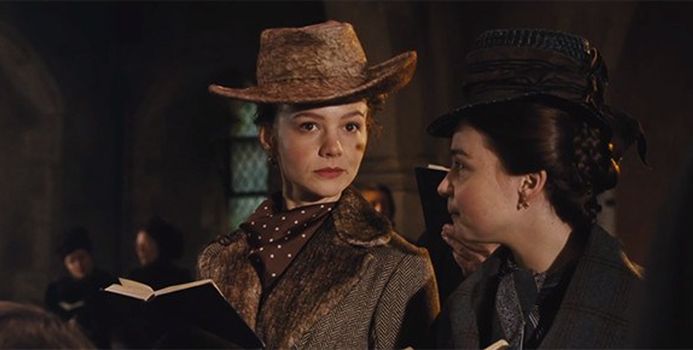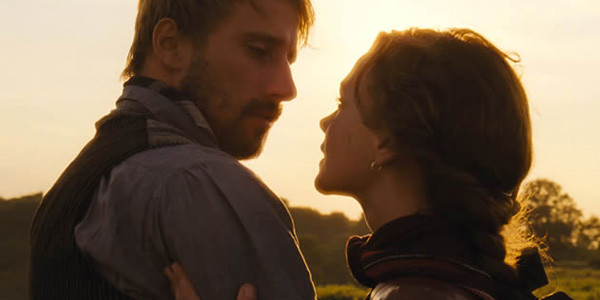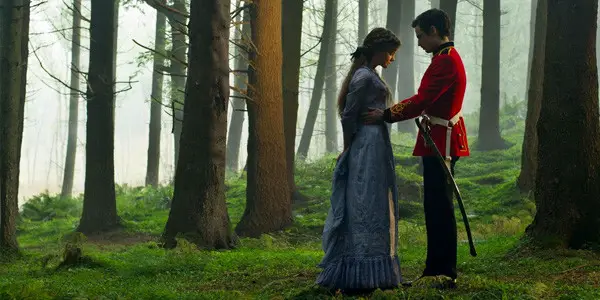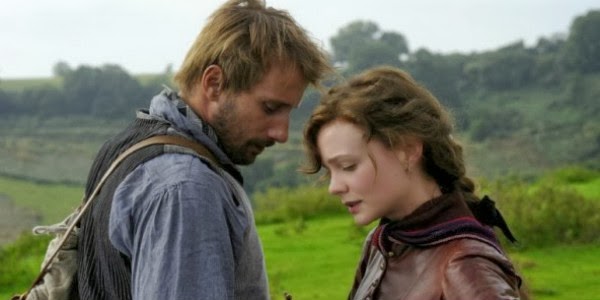FAR FROM THE MADDING CROWD: Yet Another Stale Period Drama

Alistair is a 25 year old writer based in Cambridge.…
Every now and again, a movie adaptation of a novel is made by the perfect directorial fit for the source material, that helps it stay true to the original text and create a new visionary approach that helps it stand on its own two feet as a distinctive work of art.
Danish director Thomas Vinterberg has had an eclectic career, yet is mainly renowned for his two emotionally fraught dramas about the devastating effects of child abuse, his 1998 debut Festen (The Celebration) and his previous feature, 2012’s magnificent The Hunt. These movies are excellent in how they don’t spare the viewer from the histrionic emotions that engulf the characters and completely ruin their lives – The Hunt, starring the always-fantastic Mads Mikkelsen as a primary school teacher wrongly accused of abusing a pupil, could easily draw comparisons with Thomas Hardy.
This should be a radical adaptation – but it is hopelessly ordinary
One of the titans of English literature in the 19th century, Hardy drew considerable criticism in his time for having an entirely misanthropic approach to his characters, never sparing them from anything other than total despair. This isn’t entirely different from Vinterberg’s approach to characterisation, so an adaptation of a novel by a famous misanthrope by a director with a similarly misanthropic point of view should be a perfect fit.

However, instead of an adaptation of, say, Tess of the d’Ubervilles (about a woman who gets sexually abused by a man, a novel that was recently and unironically chosen as Anastasia Steele’s favourite novel in Fifty Shades of Grey), Vinterberg has adapted Far From the Madding Crowd, a quietly radical feminist text that is defined by having that rare thing for Hardy – a happy ending. The movie feels more like a “director-for-hire” job than a passion project and manages to end up feeling merely adequate instead of an emotionally rousing experience.
The movie differs from both the novel and previous cinematic adaptations of this text by putting sole focus on the female lead, Bathsheba Everdene, here played by the usually fantastic Carey Mulligan in a performance that can only really be described as ordinary. The movie opens with her getting a proposal from sheep farmer Gabriel Oak (Matthias Schoenaerts), which she rejects as she doesn’t want to get married, a rarity for a woman in this period.

Soon, all of Oak’s sheep commit mass suicide by jumping off a cliff, leaving him broke and jobless, whilst Everdene inherits a farm of her own and two more suitors who too want her hand in marriage, kindly older man William Boldwood (Michael Sheen) and an army sergeant who is something of a massive dickhead, played by Tom Sturridge.
How has a director so visually distinctive made a movie that looks like it could have been made by anyone?
As a director, Thomas Vinterberg first drew international attention prior even to the release of his debut movie, as one of the co-authors of the “Dogme 95 Manifesto” with Lars Von Trier. The manifesto was made because both directors wanted to return to a “purity” of cinema, by focusing solely on narrative and no flashy visuals; all movies would be filmed on camcorders, using only natural sound and lighting, with props and sets forbidden (to name but a few rules). Both directors only made one movie using the manifesto as a template, Vinterberg’s aforementioned debut Festen and Von Trier’s disability-blackface comedy The Idiots.
This is likely for one important reason: the rules of the Dogme manifesto permit “no genre movies” and both directors like to experiment with different movie making styles. Since The Idiots, Von Trier has made (in this order) a musical, the first two parts of a western trilogy (using only “artificial” sets), a work-place comedy, and a trilogy of depression themed movies that begins with torture porn and sci-fi before ending with a five and a half hour porn epic. Vinterberg on the other hand, has found himself coming back to rousing emotional dramas after every flirtation with different genres (even if he doesn’t film them in the same groundbreaking way as his debut) and it’s easy to see why – he just doesn’t have a style distinctive enough to put an authorial stamp on any work he didn’t write as well.

Some of the cinematography possesses the same grit that personified the debut, such as the quite astonishing mass farmyard suicide, whilst some of the more intimate (i.e. sex) scenes recall the handheld camera work of Festen. There are also some brilliant scenes elsewhere too, such as a beautiful duet between Michael Sheen and Carey Mulligan (who thanks to Shame and Inside Llewyn Davis, we know is as talented as a singer as she is as an actress), as well as an astonishing scene of swordplay that doubles up as a metaphor for foreplay – Vinterberg doesn’t even hide this, bringing Everdene to the brink of orgasm whilst a man waves a weapon around her face. Yet the film as a whole fails to add up to anything memorable, even at two hours (a full hour shorter than the previous adaptation) it feels like it could happily have an extra half hour cut out of it.
Verdict
This is a film that feels more adequate than essential – with the exception of the underused Matthias Schoenaerts (who delivers an English accent better than all of the other cast members and this is one of his first films in this language), the cast give performances that barely register. Far From the Madding Crowd feels like a missed opportunity more than anything else, as instead of playing to the strengths of both author and director (and even with extra focus on the feminist subtext), it coasts on playing to the conventions of the same old stale period dramas that will be playing on Sunday afternoon TV for years to come.
What are your favourite period dramas? And what are the most radical period dramas?
Far from the Madding Crowd is out now in the UK and the US. All International release dates can be found here.
(top image source: Fox Searchlight)
Does content like this matter to you?
Become a Member and support film journalism. Unlock access to all of Film Inquiry`s great articles. Join a community of like-minded readers who are passionate about cinema - get access to our private members Network, give back to independent filmmakers, and more.
Alistair is a 25 year old writer based in Cambridge. He has been writing about film since the start of 2014, and in addition to Film Inquiry, regularly contributes to Gay Essential and The Digital Fix, with additional bylines in Film Stories, the BFI and Vague Visages. Because of his work for Film Inquiry, he is a recognised member of GALECA, the Gay & Lesbian Entertainment Critics' Association.













